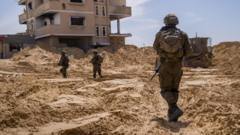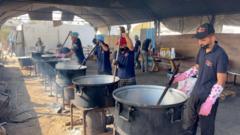As Gaza continues to face a comprehensive blockade, humanitarian concerns are reaching alarming levels with a rise in preventable illnesses and deaths amongst its two million residents.
Rising Humanitarian Crisis in Gaza: Food and Medicine Scarcity Intensifies

Rising Humanitarian Crisis in Gaza: Food and Medicine Scarcity Intensifies
The ongoing siege of Gaza exacerbates conditions for civilians as shortages lead to severe health crises.
In the midst of a prolonged humanitarian crisis, the health situation in Gaza has become dire following Israel’s total siege, which has persisted for more than two months. This blockade has halted not only food and fuel but also the essential supply of medicines needed for many who rely on routine treatments. Muneer Alboursh, the director general of Gaza's health ministry, is finding it increasingly difficult to provide answers to desperate doctors and patients alike.
Calls for medicines are growing urgent among healthcare providers, with patients—including those suffering from treatable conditions like heart disease and kidney failure—reaching out directly in hopes of finding alternatives. As Alboursh noted in a grim acknowledgment, "In most cases, those patients die." Despite Israel's insistence that the blockade remains lawful and that sufficient provisions exist, the stark reality contradicts these claims. Humanitarian organizations and European officials have condemned the blockade, arguing that it's being leveraged as a political tool and violates international law.
The ramifications of this blockade are pervasive, affecting nearly every aspect of life for the trapped population in Gaza. The blockade builds on nearly two decades of restrictions following Hamas's takeover in 2007. As the situation escalates and humanitarian needs rise, the international community continues to call for urgent action to address this deepening crisis.
Calls for medicines are growing urgent among healthcare providers, with patients—including those suffering from treatable conditions like heart disease and kidney failure—reaching out directly in hopes of finding alternatives. As Alboursh noted in a grim acknowledgment, "In most cases, those patients die." Despite Israel's insistence that the blockade remains lawful and that sufficient provisions exist, the stark reality contradicts these claims. Humanitarian organizations and European officials have condemned the blockade, arguing that it's being leveraged as a political tool and violates international law.
The ramifications of this blockade are pervasive, affecting nearly every aspect of life for the trapped population in Gaza. The blockade builds on nearly two decades of restrictions following Hamas's takeover in 2007. As the situation escalates and humanitarian needs rise, the international community continues to call for urgent action to address this deepening crisis.




















